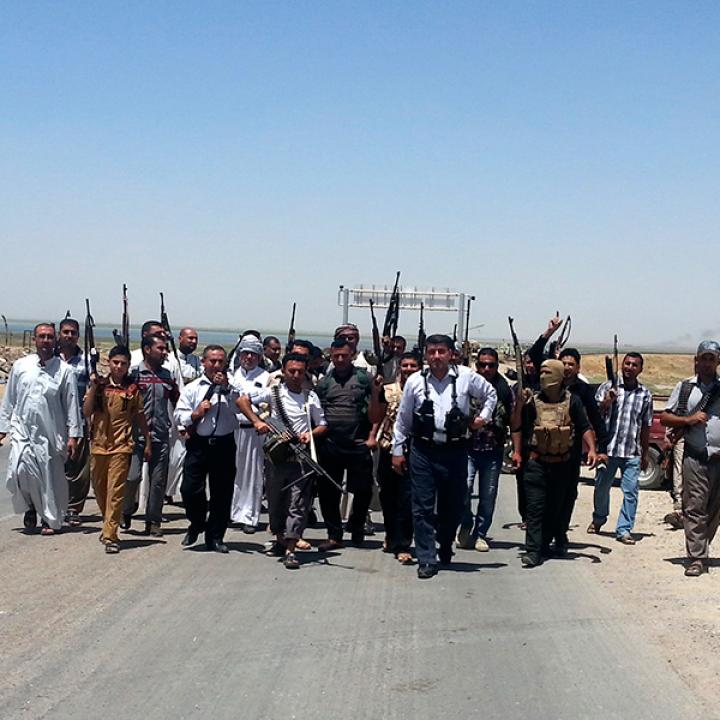

As a leading general once said of past insurgencies in the region, “The only way to defeat guerillas is with better guerillas."
As the Obama administration begins to implement its strategy to defeat the Islamic State of Iraq and al-Sham (ISIS), Iraq's tribes are getting a fresh look as a possible partner to confront the terrorist group. Having successfully utilized tribal groups against al-Qaeda in the Sunni Arab heartland of Anbar Province in 2006-2008 during the Awakening movement, Iraq's tribes provide the U.S. with a number of advantages in an era where placing U.S. troops directly in harms way is off the table. Arab tribes are a social institution based upon extended family and kinship ties that operate like a system with members sharing obligations to each other and to their leaders or sheiks. The tribal structure is hierarchical, usually led by a paramount sheik, with sub-sheiks leading smaller tribal groupings or family clans. These tribal structures can be harnessed to use family loyalty to trump Islamist identity and to better organize communities to resist oppression.
The "Anbar model" consisted of enlisting local tribes in their own defense by working through local sheiks to form community police forces to not only protect local villages but to partner with the Iraqi Army and Iraqi Police against al-Qaeda. When successfully applied to the Fallujah area in 2007, in addition to using a counter-insurgency approach for the city, the number of security incidents went from approximately 750 in March to less than 80 in October. The key benefit of working with the tribes is that they rob the insurgency of manpower by employing their potential recruits into the government's security services, it increases the eyes and ears of the government against the insurgency, and organizes the community to better resist insurgent intimidation. This very successful program turned Anbar Province around but was eventually undercut by the Maliki Government as it reduced and then eliminated funding, persecuted tribal leaders, and marginalized the Sunni Arab community.
A U.S. strategy to defeat ISIS must enlist the tribes in Sunni Arab provinces in their own defense in order to resist and then to roll back the Islamist movement's forces. A determined campaign using only the Iraqi Army will not be sufficient since they are predominantly Shiite, do not come from the areas they seek to liberate, and legitimate concerns exist about their fighting ability. A synchronized effort of army, police, and tribal forces must be used to push ISIS out of the areas it controls and a new tribal outreach effort must be attempted applying the "Anbar model" to other parts of the country. However, a new tribal outreach effort must be tailored to the current political situation in Iraq, the fact that large numbers of U.S. troops are no longer there, and a deficit of trust exists between many Sunni Arabs and the central, Shiite-led government. One model for such an approach is Yemen where the Yemeni army launched a clearing operation against al-Qaeda in April utilizing tribal Popular Committees which had spontaneously organized to fight the terrorist group. Since the U.S. does not have sizable numbers of soldiers in Yemen this may serve as a possible way forward for Iraq.
The first step to enlist Iraq's tribes against ISIS is to integrate their leaders into security planning in Baghdad and use U.S. forces to serve as a bridge between the tribes and the government. The next step is for the U.S. to pledge money for salaries and other support to these tribal forces for at least five years in order to ensure that they will be paid and won't have their money cut off as occurred during the Maliki Government. This will do a lot to reassure tribal leaders and build trust. A round of tribal engagement must then be undertaken with sheiks who have fled western and northern Iraq in order to introduce the security initiative and a training program should be created in Jordan and Turkey to train tribal members. A new tribal awakening is possible in Iraq just as long as the U.S. applies the lessons it has learned from its years of war and remembers that, in the words of the former commander of the Arab Legion of Jordan, General John Bagot Glubb, "[t]he only way to defeat guerillas is with better guerillas, not by the methods of regular warfare."
Daniel Green, a military veteran of Iraq and Afghanistan, is a Defense Fellow at The Washington Institute. Together with William F. Mullen III, he recently coauthored the study Fallujah Redux: The Anbar Awakening and the Struggle with al-Qaeda (Naval Institute Press).
The Hill



